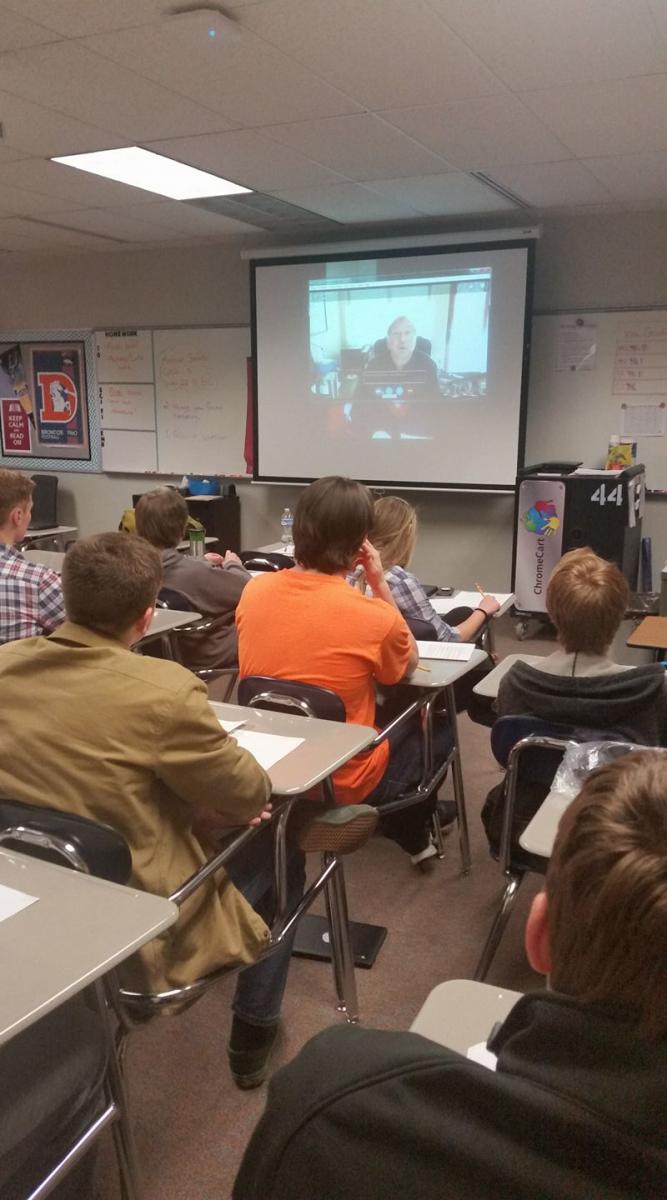Skype Q&A Session with High School SF Class
I had a Skype Q&A session with Laurel Syring's science fiction class at Windsor High School in Windsor, Colorado on February 15, 2017. The students had excellent questions during the session.

Here are their follow-up written questions and my answers.
How do you find inspiration and make it new and exciting when considering other author's works, conversations, or other inspirations?
It can be intimidating to read a simply wonderful book by another writer and feel that book is completely out of your reach to write. And that may be true sometimes, at least for a while, because different kinds of books build of different strengths. But by experimenting over time, you can find your strengths and play to them. Reading great books by other writers is one way to push yourself to try to make each new work better than your prior work. Paradoxically, one of the greatest moments as a writer is to look back at an older work and say to yourself, “You know, this really isn’t very good.” The silver lining in that cloud is that making that observation means you’ve grown and reached another plateau in your growth as a writer. Keep aiming higher and higher.
Why do you believe Manhattan Transfer was so commercially successful?
For one thing, it has elements of big-budget action-adventure films. For another, I seem to have a knack for taking really out-there situations and making them convincing. I’ve been known to take artistic license sometimes, but generally I try to play by the rules of science. MT is a bit of a celebration of human resilience and ingenuity, so maybe that helped, too.
Have you changed your writing style, the writing process, or research process from your first novel to what you're currently writing?
My tools have evolved over time, but my underlying process is similar. I usually start a novel with a trio of elements. I pick a character and an emotional issue I’m interested in exploring. I pick a science-fictional element I’d like to use. And I find a setting that supports the first two. I personally plot a novel up front so I know where I’m going and I can foreshadow and drop clues along the way. Some writers just start writing and see where they wind up, and that works for them. One hundred writers probably have 100 ways of getting the job done. Do whatever works for you.
What advice would you give someone who genuinely wants to work in the literary world as an author? Are there right or wrong paths to take?
Write what you love. Write the kind of thing you would enjoy reading. If you try to follow trends or anticipate the next big thing, you probably won’t be as successful. Write because you love the process, not because you hope to get rich. To be brutal, I’d say if you can quit writing do so, and find any of many other rewarding career choices. But if you need to write, if you feel compelled to write, don’t let anyone stop you. Just remember that writing can include an array of choices, from short stories to screenplays to graphic novels to novels to journals to poetry. What you write can be for publication or for your own personal enjoyment. Do it because you love it and it feeds your soul.
Because science fiction shows us what the future might possibly look like, what do you feel the future will look like?
That’s getting more and more difficult as the rate of change accelerates. A recent NPR interview was a conversation with a woman who used to work in a textile mill, as did five prior generations of her family. Now the plant has closed. That business moved to another country and is likely highly automated now. For centuries, people lived lives very much like their parents did and their grandparents before them. That’s no longer true. Today we have people making their living by doing search engine optimization or by selling social media expertise. Even twenty years ago those careers were unimaginable. In our future, we’re likely to see true artificial intelligence, huge medical breakthroughs, transformations in energy sources, full blown virtual reality, far more monitoring of people, more and better autonomous vehicles, and better and better understanding of the human body (and especially the brain).
